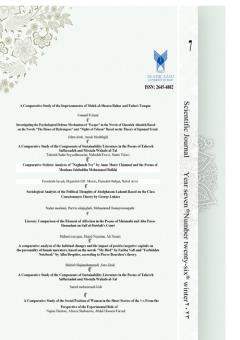A comparative study of the change of habits with negative/positive capitals in the character of female narrators
Subject Areas : Comparative Literature Studies
mahtab hajimohammadi
1
![]() ,
sara Zirak
2
,
sara Zirak
2
1 - Professor of Farsi Language and Literature Department, Islamic Azad University, Faculty of Science and Research, Tehran, Iran. (corresponding author),
2 - Assistant Professor, Department of persian, Department of Science and Research, Islamic Azad University, Tehran, Iran.
Keywords: Women, Habitus, Pierre Bourdieu, Capitals, Vefi, Desspedes,
Abstract :
Pierre Bourdieu's theory of types of capital represents capitals and the effect of their types on each other in different ways. In Bourdieu's definition, the types of capital are: "Economic, cultural, social and symbolic capital". This article, with a comparative look at the habits influenced by the capitals of female narrators in the novels "My Bird" and "Forbidden Notebook", examines the effect of capitals on each other and changes the habits of female narrators, and shows with a descriptive-analytical method what effect the habits have on creating They have positive and negative funds. The most obvious negative habits of female actors in novels; Silence, passivity, isolation, submission and satisfaction of the men of the family without the least action and protest are in line with the otherness of the narrator's women and the most specific positive habits; Loyalty, motherhood, sense of responsibility, sacrifice and kindness. As a result, the nature of women's habits has either not changed, or has progressed in the direction of negative and negative production and reproduction, or if there is a slight change in the production and reproduction of positive capitals, it is pale in the shadow of the passivity of the narrators. The comparative result of the research shows the common structural position of two women in two different societies, whose similar and repeated experiences create common traits and habits. These similar behaviors and habits, in turn, give structure to their positive or negative social actions; That is, it sets guidelines and limits their activity. Or in very few social spaces, it removes passivity and limitations. But in the end, the revelation of the women's passivity in the economic fields, the inefficiency of the social spaces (before and after marriage), in the use of social capital, and the poverty of the economic, cultural and symbolic capital in the narrator's women.
_||_


